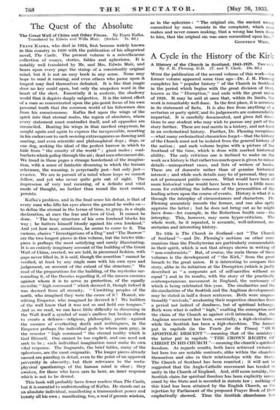The Quest of the Absolute
The Great Wall of China and Other Pieces. By Franz Kafka. Translated by Edwin and Willa Muir. (Seeker. 7s. 6d.) FRA...NZ KAFKA, who died in 1924, first became widely known in this country in 1930 with the publication of his allegorical novel, The Castle. The present volume is a miscellaneous collection of essays, stories, fables and aphorisms. It is notably well translated by Mr. and Mrs. Edwin Muir, and bears upon every page the stamp of a consistently original mind, but it is not an easy book in any sense. None may hope to read it running, and even others who pause upon it longest may find themselves defeated. It is like that magic door no key could open, but only the unspoken word in the heart of the elect. Essentially it is esoteric, the shadowy world that it depicts deeply subjective. It is the intent effort of a man so concentrated upon the pin-point focus of his own personal truth that the common world of his fellowmen dies from his consciousness. Kafka fled upon the wings of the spirit into that eternal realm, the region of absolutes, where every statement must contradict itself, and all opposites are reconciled. Beating his wings in that rarefied empyrean, he sought again and again to express the inexpressible, resorting in his endeavour to such seeming extravagances as dancing and soaring, and even scientific and philosophical dogs ; dogs, or one dog, seeking the ideal of the perfect burrow in which to hide from " the enmity of the world " ; giant moles ; coal- buckets which gallop through the air ; dead men who cannot die. We tread in these pages a strange borderland of the imagina- tion, with a sense of fantastic dreaming in which the human relevance, the meaning, is perpetually just—but only just— evasive. We are in pursuit of'a mind whose leaps we cannot follow, and yet who never quite gets out of sight. The impression of very real meaning, of a definite and vital mode of thought, no farther than round the next corner, persists.
Kafka's problem, and in the final sense his defeat, is that of every man who lifts his eyes above the ground he walks on- to define the eternal in the terms of time, to grasp, in a single declaration, at once the fear and love of God. It cannot be done. " The bony structure of his own forehead blocks his way ; he batters himself bloody against his own forehead." And yet how near, sometimes, he seems to come to it. The curious, elusive "Investigations of a Dog " and " The Burrow " are the two longest pieces in this volume, but the briefer title- piece is perhaps the most satisfying and surely illuminating. It is an entirely imaginary account of the building of the Great Wall of China, erected, we are told, in piecemeal fashion, with gaps never filled in, it is said, though the assertion " cannot be verified, at least by any single man with his own eyes and judgement, on account of the extent of the structure." We read of the preparations for the building, of the mysteries sur- rounding it, of the theories regarding it, of the unseen enemies against whom it is to serve as protection, of the equally invisible " high command " which decreed it, though indeed it was decreed from all eternity. " Unwitting peoples of the north, who imagined they were the cause of it ! Honest, un- witting Emperor, who imagined he decreed it I We builders of the wall know that it was not so and hold our tongues." And as we read, we can have little difficulty in discerning in the Wall itself a symbol of man's endless but broken efforts to create a defence—religious, philosophic, poetic—against the menace of everlasting death and nothingness, in the Emperor perhaps the individual gods to whom men pray, in the remoter " high command " the eternal reality which is God Himself. One cannot be too explicit, and one need not seek to be ; each individual imagination must make its own vital response. The fragments, the brief fables, many of the aphorisms, are the most enigmatic. The longer pieces already named are puzzling in detail, even to the point of an apparent perversity in obscurity, but their relevance to the meta- physical questionings of the human mind is clear ; they awaken, for those who have ears to hear, an inner response which is not to be denied.
This book will probably have fewer readers than The Castle, but it is essential to understanding of Kafka. He stands out as an absolute individual, manifesting a transcendent power and beauty all his own ; manifesting, too, a real if gnomic wisdom, as in the aphorism : " The original sin, the ancient wrong committed by man, consists in the complaint, which man makes and never ceases making, that a wrong has been done to him, that the original sin was once committed upon him."
GEOFFREY WEST.
















































 Previous page
Previous page